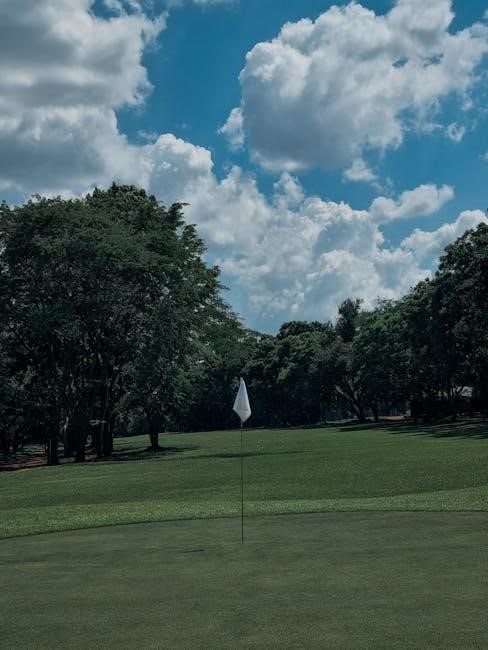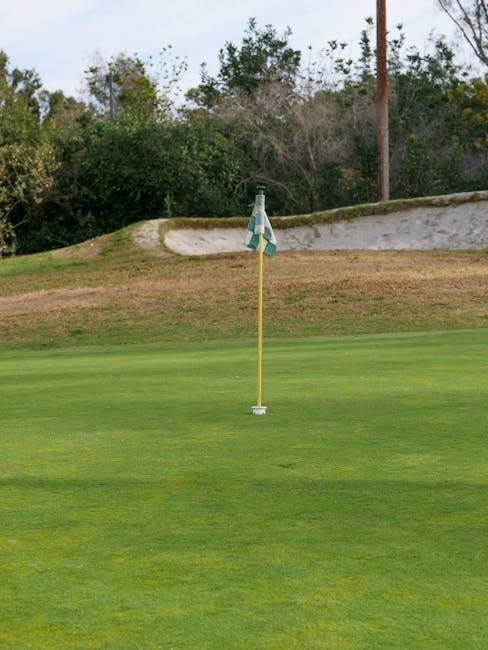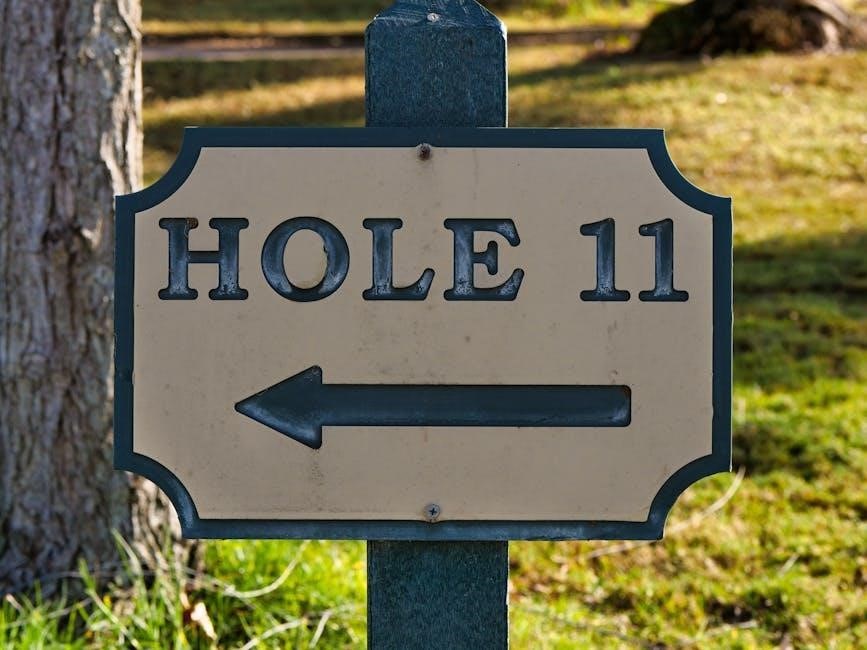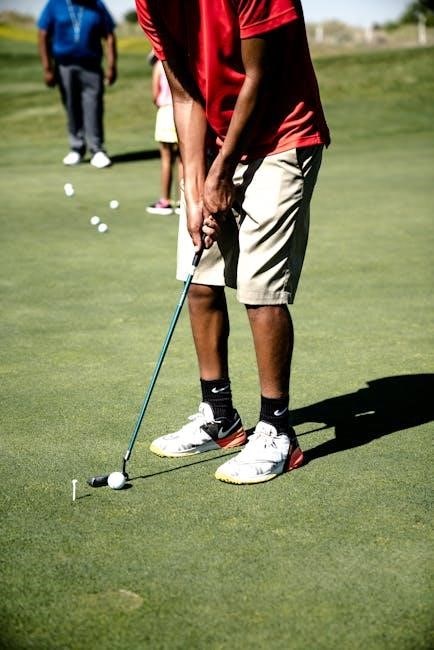Frisbee golf‚ or disc golf‚ is a recreational outdoor activity played with a frisbee and metal baskets. The PDGA governs official rules‚ ensuring fair play and consistency worldwide. Players aim to complete each hole with the fewest throws possible‚ using specialized discs. The game combines physical skill and mental strategy‚ making it accessible to all ages. Understanding the rules‚ including scoring‚ equipment‚ and course etiquette‚ is essential for a enjoyable experience.
1.1 What is Frisbee Golf?
Frisbee golf‚ also known as disc golf‚ is a recreational outdoor activity where players throw a disc toward a metal basket. The objective is to complete each hole with the fewest throws possible. Played on natural courses‚ often in forests‚ the game combines elements of traditional golf with the simplicity of throwing a frisbee. Governed by the PDGA‚ it emphasizes fair play and sportsmanship. Players navigate obstacles like trees and terrains‚ making it both challenging and enjoyable for all skill levels. The game is accessible‚ requiring minimal equipment and promoting physical activity.
1.2 Objective of the Game
The primary objective of frisbee golf is to complete each hole with the fewest throws possible. Players aim to land their disc in a metal basket‚ which serves as the hole. Each throw must be released from the tee area‚ and the player with the lowest total throws at the end of the course wins. The game tests accuracy‚ strength‚ and strategy‚ as natural obstacles like trees and hills add challenge. Following the PDGA rules ensures fair competition and enjoyable play for all participants.

Essential Equipment for Frisbee Golf
The primary equipment includes a PDGA-approved disc and a metal basket target. Players may also use a mini disc marker and carry a bag for convenience.
2.1 Discs Used in Frisbee Golf
In frisbee golf‚ players use specialized discs designed for accuracy and distance. These discs are PDGA-approved‚ ensuring they meet size‚ weight‚ and rim requirements. They are typically divided into three categories: drivers‚ mid-range‚ and putters. Drivers are used for long-distance throws‚ while putters are designed for precise‚ short throws into the basket. The choice of disc depends on the player’s skill level and the specific demands of each hole. Proper selection enhances performance and overall gameplay experience.
2.2 The Role of the Basket or Target
The basket‚ or target‚ is a critical component in frisbee golf‚ serving as the hole’s endpoint. It typically consists of a metal pole with chains hanging above a basket-like container. The chains act as a catching mechanism‚ slowing down and guiding the disc into the basket. Completing a hole requires landing the disc within the basket. The basket’s design is standardized by the PDGA‚ ensuring uniformity across courses. Each basket is secured in the ground‚ providing a stable target for players to aim at during their throws. Its role is central to the game’s objective and scoring system.

Basic Rules of Play
Frisbee golf involves throwing a disc towards a target‚ with the goal of completing each hole in the fewest throws. Players take turns‚ starting from a tee area. The disc must be released from the hand‚ and where it lands determines the next throw’s position. The game emphasizes fair play‚ respect for others‚ and adherence to course rules. Etiquette‚ such as allowing faster groups to play through‚ is essential for a smooth experience.
3.1 Course Setup and Structure
A disc golf course typically features 18 holes‚ each consisting of a tee area and a target‚ often a metal basket with chains. The layout varies‚ incorporating natural obstacles like trees‚ hills‚ and water hazards to challenge players. Each hole is designed to require strategic throws‚ with distances ranging from short‚ technical shots to long‚ open drives. Courses are usually set in wooded or mixed terrain‚ adding complexity and beauty to the game. The setup ensures a diverse and engaging experience for players of all skill levels.
3.2 Throwing Rules and Etiquette
In disc golf‚ players take turns throwing from the tee area. Each throw must be released from behind the designated line. The order of play typically follows the scorecard‚ with the lowest scorer throwing first. Courtesy is key; players should avoid distracting others and yield when necessary. Safety is paramount—never throw until the area is clear. A courtesy violation occurs if a player refuses to follow basic rules‚ such as assisting in disc searches or maintaining proper scorekeeping. Etiquette ensures a respectful and enjoyable experience for all participants on the course.
3.3 Scoring System
Disc golf uses a scoring system similar to traditional golf‚ where the goal is to complete each hole with the fewest throws possible. Players record their scores on a scorecard‚ with penalties (e.g.‚ one-stroke penalties for out-of-bounds or lost discs) added to their total. The player with the lowest score at the end of the round wins. Proper scorekeeping and signing the scorecard are essential for accuracy. The PDGA rules emphasize fair play and adherence to the scoring system to ensure a competitive and enjoyable game for all participants.
3.4 Special Rules and Penalties
Special rules and penalties in disc golf ensure fair play and safety. A one-stroke penalty is incurred for out-of-bounds throws or lost discs. Courtesy violations‚ such as refusing to assist in searching for a lost disc‚ result in penalties. Players must adhere to these rules to maintain the integrity of the game. The PDGA guidelines outline specific penalties for various infractions‚ ensuring consistency across all courses. Understanding these rules is crucial for competitive play and maintaining a respectful environment for all participants. Penalties are applied to scores to reflect adherence to the game’s regulations.

Advanced Rules and Exceptions
Advanced rules address unique scenarios like out-of-bounds‚ obstacles‚ and mandatory routes. These exceptions ensure fair play and challenge players to adapt to course-specific conditions strategically.
4.1 Out-of-Bounds (OB) Rules
Out-of-bounds areas are designated by course boundaries or specific rules. If a disc lands out of bounds‚ a one-stroke penalty is incurred‚ and the player must replay from the previous position or a designated drop zone. OB areas include water hazards‚ private property‚ or areas marked by the course. Players must accurately determine if their disc is out of bounds to avoid unfair play. Understanding OB rules is crucial for maintaining the integrity of the game and ensuring fair competition for all participants involved in disc golf.
4.2 Obstacles and Natural Challenges
Natural obstacles like trees‚ water hazards‚ and rough terrain are integral to disc golf‚ adding challenge and strategy. Players must navigate around or over these elements without moving or altering them. If a disc lands in a water hazard or dense undergrowth‚ it may be considered out of bounds or lost‚ resulting in penalties. The natural environment is a key part of the game‚ requiring skill and adaptability. Understanding how to play around obstacles is essential for mastering the sport and enjoying the unique aspects of each course.
4.3 Island Holes and Mandatory Routes
Island holes require players to land their disc on a designated area surrounded by out-of-bounds zones‚ such as water or dense woods. Mandatory routes‚ marked by arrows or signs‚ must be followed to ensure players pass through specific lines or paths. These challenges add strategic depth and precision to the game. Failure to adhere to these rules results in penalties‚ emphasizing the importance of accuracy and adherence to course guidelines. These elements enhance the complexity and enjoyment of disc golf‚ testing players’ skills and knowledge of the course layout.

Local Rules and Variations
Local rules are course-specific guidelines that accommodate unique layouts and conditions. Common variations include alternate tee positions‚ temporary rules‚ and special penalties‚ ensuring fair play and adaptability.
5.1 Course-Specific Rules
Course-specific rules are tailored to the unique features of each disc golf course. These may include mandatory routes‚ island holes‚ or special obstacles. Players must adhere to any posted local rules‚ which are designed to enhance play and safety. For example‚ some courses may designate certain areas as out-of-bounds or require specific drop zones. These rules are often outlined in the course map or provided by staff. Familiarizing oneself with these rules before play is essential for a smooth and enjoyable experience.
5.2 Common Local Variations
Local variations in disc golf rules often arise to accommodate specific course conditions or regional preferences. These may include alternate tee positions‚ experimental rules‚ or adjustments to out-of-bounds areas. For example‚ some courses adopt “island holes” where missing the designated area results in a penalty. Others may enforce “mandatory routes” requiring discs to pass through or around certain obstacles. Seasonal variations‚ such as winter rules‚ may also be implemented to account for weather-related challenges. These adaptations enhance playability while maintaining the core principles of the game; Players should always review course-specific rules before starting a round to ensure compliance and fair play;

PDGA Official Rules and Guidelines
The PDGA updates official disc golf rules annually‚ effective January 1‚ ensuring fair play. The Competition Manual and online rules provide authoritative guidelines for players and events.
6.1 Overview of PDGA Regulations
The PDGA regulations establish a standardized framework for disc golf‚ ensuring consistency across all events. Key areas include equipment specifications‚ course layout‚ and player conduct. The rules outline procedures for scoring‚ penalties‚ and out-of-bounds plays‚ promoting fair competition. Regular updates maintain relevance‚ with major revisions published annually. These guidelines are essential for both casual and competitive play‚ fostering a unified understanding of the game worldwide. Adherence to PDGA rules ensures a fair and enjoyable experience for all participants.
6.2 Competition Manual and Updates
The PDGA Competition Manual provides detailed guidelines for organizing and managing disc golf events. Updated annually‚ it ensures consistency and fairness in competitions. Effective January 1st of each year‚ revisions address evolving needs and clarify rules. The manual covers event setup‚ player eligibility‚ and procedural standards. It acts as a companion to the Official Rules of Disc Golf‚ offering practical advice for tournament directors. Staying informed about updates is crucial for organizers and players to ensure smooth‚ competitive events. The manual’s updates help maintain the integrity and enjoyment of the sport at all levels.

Etiquette and Sportsmanship

Ettiquette and Sportsmanship
Etiquette in disc golf emphasizes respect for other players‚ the course‚ and nature. Players should yield turns‚ avoid distractions‚ and assist in searching for lost discs. Safety and awareness are paramount‚ ensuring no throws are made that could endanger others. Maintaining a clean course and following local rules fosters a positive environment for all. Courtesy violations‚ like refusing to help‚ can lead to penalties. Good sportsmanship enhances the enjoyment of the game for everyone involved.
7.1 Player Conduct and Respect
Player conduct is a cornerstone of disc golf‚ emphasizing respect for fellow players‚ the course‚ and nature. Respectful behavior includes yielding turns‚ avoiding distractions‚ and refraining from dangerous throws. Players must assist in searching for lost discs‚ as refusing to do so constitutes a courtesy violation. Maintaining a clean course and following local rules fosters a positive environment. Positive conduct enhances the game’s enjoyment for everyone‚ ensuring a welcoming and fair experience for all participants.
7.2 Safety and Awareness on the Course
Safety and awareness are crucial in disc golf to prevent accidents and ensure a secure environment for all players. Always check surroundings before throwing‚ ensuring no one is within range. Be mindful of potential hazards like wildlife‚ uneven terrain‚ and weather conditions. Players must signal the group when retrieving discs near others. Additionally‚ avoid distractions that could lead to unsafe situations. By prioritizing safety and staying vigilant‚ players protect themselves and others‚ contributing to a safe and enjoyable game.

Learning the Rules
Mastering the basics is key to enjoying disc golf. Start with essential rules like scoring‚ throwing etiquette‚ and course navigation. Understanding penalties and proper conduct enhances gameplay and sportsmanship.
8.1 Resources for Beginners
New players can access the PDGA Official Rules online for detailed guidelines. Beginners benefit from instructional videos‚ local disc golf communities‚ and starter guides. Many courses offer maps and scorecards to help navigate the layout. Additionally‚ mobile apps like Udisc provide rules summaries‚ course directories‚ and scoring tools. Attending clinics or joining beginner leagues can also accelerate learning; These resources ensure a smooth introduction to the game‚ fostering confidence and enjoyment from the first throw.
8.2 Common Mistakes to Avoid
Beginners often make mistakes like improper scoring‚ not understanding out-of-bounds rules‚ or ignoring safety protocols. Incorrect score tracking can lead to disputes‚ so always verify scores after each hole. Not knowing OB rules can result in unnecessary penalties. Ignoring safety by throwing when others are nearby is risky. Forgetting to familiarize yourself with the course layout can lead to lost discs or penalties. Improper disc handling during throws can affect accuracy. Awareness of these common errors helps players improve quickly and enjoy the game more.
Frisbee golf is a fun‚ accessible sport combining physical skill and mental focus. By following official rules and guidelines‚ players ensure fair and enjoyable gameplay for everyone.
9.1 Summary of Key Points
Frisbee golf is a fun‚ accessible sport combining physical skill and mental focus. By following official rules and guidelines‚ players ensure fair and enjoyable gameplay for everyone. The objective is to complete each hole with the fewest throws possible‚ using a frisbee disc aimed at a metal basket. Essential equipment includes a disc and a target basket. PDGA rules govern play‚ ensuring consistency and fairness. The scoring system mirrors traditional golf‚ with the lowest total strokes winning. Understanding the rules enhances the experience and promotes sportsmanship.
9.2 Encouragement to Play and Learn
Frisbee golf is a rewarding sport for all ages‚ offering a mix of challenge and enjoyment. Whether you’re a beginner or an experienced player‚ consistent practice and patience will help refine your skills. The community is welcoming‚ with many local groups and online resources available to guide your learning journey. Don’t hesitate to explore nearby courses‚ as the fresh air and scenic environments make every round a unique adventure. Grab a disc‚ head outdoors‚ and embrace the fun of disc golf—your progress and passion will grow with each throw!

Additional Resources
For further learning‚ visit the PDGA website for the official rules PDF and competition manuals. Explore training guides‚ videos‚ and community forums to enhance your knowledge and skills.
10.1 Official PDGA Rules PDF
The PDGA Official Rules of Disc Golf provides comprehensive guidelines for players. Updated annually‚ the PDF includes rules on equipment‚ scoring‚ and penalties. Available on the PDGA website‚ it’s essential for understanding game standards. The document covers course setup‚ player conduct‚ and specific scenarios‚ ensuring clarity for both casual and competitive play. Referencing this resource helps maintain fair and enjoyable gameplay across all levels. Download the latest version to stay informed on rule changes and best practices for disc golf.
10.2 Recommended Reading and Guides
Supplement your knowledge with guidebooks and online resources that delve into disc golf strategy and advanced techniques. The PDGA offers instructional guides‚ while independent authors provide tips on improving your game. Websites like Disc Golf Pro Shop and Ultiworld Disc Golf feature articles‚ tutorials‚ and course reviews. Additionally‚ YouTube channels such as Jomez Pro offer video analysis and lessons. These resources help players refine their skills and stay updated on the latest trends and rules in disc golf;
